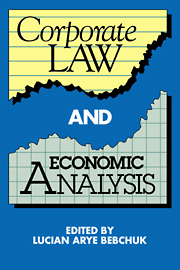Book contents
- Frontmatter
- Contents
- List of contributors
- Introduction
- Acknowledgments
- 1 Mergers, acquisitions, and leveraged buyouts: an efficiency assessment
- 2 Discounted share prices as a source of acquisition gains
- 3 Ties that bond: dual class common stock and the problem of shareholder choice
- 4 Property rights in assets and resistance to tender offers
- 5 A new approach to corporate reorganizations
- 6 The corporate contract
- 7 The state competition debate in corporate law
- 8 The positive role of tax law in corporate and capital markets
- 9 Ownership of the firm
- Index
1 - Mergers, acquisitions, and leveraged buyouts: an efficiency assessment
Published online by Cambridge University Press: 15 December 2009
- Frontmatter
- Contents
- List of contributors
- Introduction
- Acknowledgments
- 1 Mergers, acquisitions, and leveraged buyouts: an efficiency assessment
- 2 Discounted share prices as a source of acquisition gains
- 3 Ties that bond: dual class common stock and the problem of shareholder choice
- 4 Property rights in assets and resistance to tender offers
- 5 A new approach to corporate reorganizations
- 6 The corporate contract
- 7 The state competition debate in corporate law
- 8 The positive role of tax law in corporate and capital markets
- 9 Ownership of the firm
- Index
Summary
… men in general, and within limits, wish to behave economically, to make their activities and their organization “efficient” rather than wasteful. This fact does deserve the utmost emphasis; and an adequate definition of the science of economics … might well make it explicit that the main relevance of the discussion is found in its relation to social policy, assumed to be directed toward the end indicated, of increasing economic efficiency, of reducing waste.
(Knight, 1941; emphasis added)The implications of mergers, acquisitions, and leveraged buyouts are herein examined with reference to the efficiency purposes to which Frank Knight refers above. That Knight, or any other economist, should refer favorably to efficiency is hardly novel. But there is much more to the statement than a mere affirmation of efficiency. Contrary to the main tradition, Knight asserts that the manner in which economic activity is organized really matters. He furthermore treats organizational efficiency in very primitive terms: the reduction of waste.
The prevailing opinion – at the time Knight advanced these views and over the next thirty years – was that technology was largely determinative of economic organization. It was therefore customary to characterize business firms, whatever their size and configuration, as production functions. The considerable merits of this framework notwithstanding, it was also responsible for serious omissions: “How easy it is for an inefficient manager to dissipate the differentials on which profitability rests, and that it is possible, with the same technical facilities, to produce with a great variety of costs, are among the commonplaces of business experience which do not seem to be equally familiar in the study of the economist” (Hayek, 1945, p. 523; emphasis added).
- Type
- Chapter
- Information
- Corporate Law and Economic Analysis , pp. 1 - 28Publisher: Cambridge University PressPrint publication year: 1990

